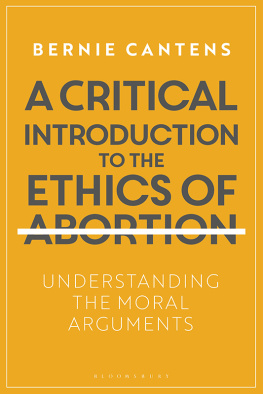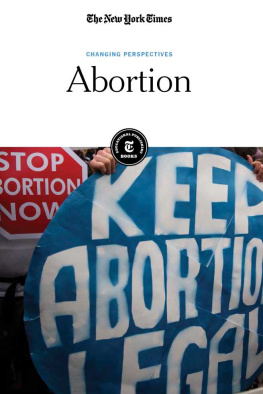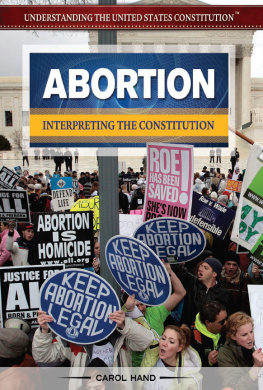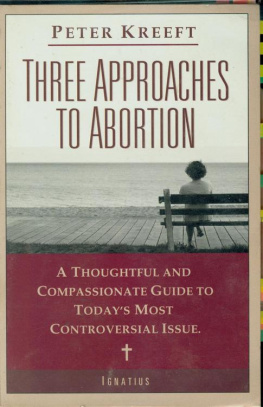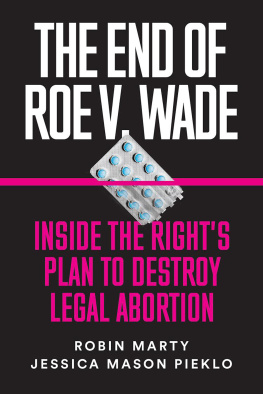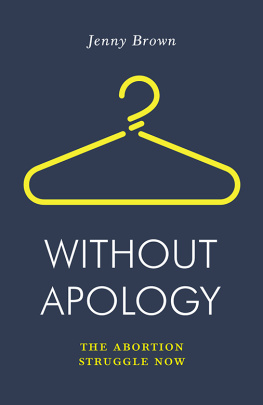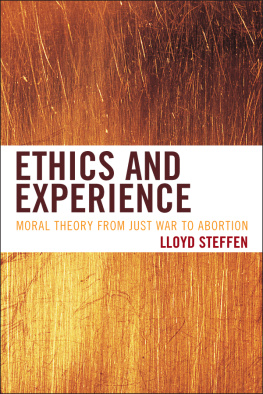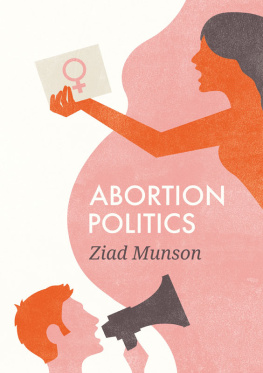A Critical
Introduction to the
Ethics of Abortion
ALSO AVAILABLE FROM BLOOMSBURY
The Aesthetics and Ethics of Copying, edited by Darren Hudson Hick and Reinold Schmcker
Nietzsche and Kantian Ethics, edited by Joo Constncio and Tom Bailey
Phantasia in Aristotles Ethics, edited by Jakob Leth Fink
Advances in Experimental Moral Psychology, edited by Hagop Sarkissian and Jennifer Cole Wright
A Critical
Introduction to the
Ethics of Abortion
Understanding the Moral Arguments
BY BERNIE CANTENS

T he purpose of this book is to provide a clear, accessible and impartial analysis of some of the most influential moral arguments that have been advanced in the past fifty years on the ethics of abortion. The abortion issue is at its core an ethical issue. This means that the moral arguments and the conclusions derived from these arguments are fundamental to the social, legal and political views on abortion. In other words, we should begin the study of the abortion issue from a moral perspective, and it should be this discourse that sets the foundations and guides the conversations for all of the further discussions on abortion from the various other perspectives.
There are several challenges to the thesis of this book. First, there are a lot of emotions and passionate feelings surrounding the abortion debate. As a result, much of the existing language and terms used in abortion contexts within mainstream popular culture, such as pro-life and pro-choice, carry with them a lot of emotive baggage. In an effort to create a more neutral discourse, I will use David Boonins terms abortion defender and abortion critic throughout the text to represent those who consider most cases of abortions to be morally permissible and those who consider most cases of abortion to be morally wrong, respectively. I will use the terms pro-life and pro-choice when I am referring to the specific movements that identify themselves with these labels, or when I refer to persons such as politicians who identify with the one of these movements, or when it is part of the content of a citation.
Second, so much has been written on the ethics of abortion that it is impossible to cover all of the excellent publications on the topic. My selection process has been guided with two objectives in mind: first, to include essays that have had a significant influence on the development of the ethical thought and philosophical arguments on abortion. This means that I tried to select essays that have marked paradigmatic shifts in the conceptual frameworks, assumptions and arguments on the ethics of abortion. Second, I have tried to present a wide range of representative views that offer a neophyte to the ethics of abortion a well-rounded and diverse presentation of the topic.
A third challenge concerns the practical constraints in writing a manuscript of this nature, namely, the manuscripts limited space and the authors limited time. This, obviously, restricts the number of works I can include as part of our study. Despite these practical limitations, the book covers some of the most central and representative arguments that have been developed from some of the most important approaches and perspectives on the abortion debate during the past five decades (e.g. personhood arguments, a moral risk assessment approach, personhood as an essentially contested concept, womens rights arguments, ethics of killing arguments, feminist arguments, virtue ethics approach).
A fourth challenge concerns the inherent difficult nature of the moral issue of abortion. We must concede that abortion is one of the most vexing, challenging and intractable moral problems for ethicists to resolve. Part of this difficulty stems from the fact that it entails five essentially interrelated ethical quandaries: (1) the moral status of the foetus, (2) the rights of the pregnant woman, (3) the rights and social status of women in society, (4) the relationship between the foetus and the pregnant woman and (5) the relationship between the moral and legal aspect of abortion.
The moral status of the foetus
The problem of abortion requires that we address the ethical issues concerning the moral status of the foetus (i.e. Is the foetus a person? When does it become a person? Does it have human rights? Does it have the right to life? Does the foetus have intrinsic value? Does the foetus have any moral standing at all?). Some of the answers to these questions depend on our definition of personhood, and personhood is a difficult concept to define. Some philosophers make a distinction between a human being and a person. According to them, the former connotes the biological elements of the organism (i.e. its genetic structure) and the latter connotes the psychological, cognitive and social elements of the organism (i.e. its ability to be self-aware, communicate, reason etc.). Moreover, some philosophers argue that only persons belong to the moral community. Therefore, being a human being is not sufficient for personhood status or to be a member of the moral community. As a result, while it might be clear that a foetus is a human being, it is not so clear that it is a person.
The rights of the pregnant woman
The moral problem of abortion is also essentially intertwined with the issues of womens individual rights, particularly her right to control her body and reproductive choices. Many feminists argue that this dimension of the abortion issue is too often ignored and neglected. They argue that the traditional debate on abortion is disproportionately focused on the foetuss personhood rights rather than the rights of the pregnant woman, and thus the debate is skewed in favour of the foetus. A thorough philosophical investigation of the issue of womens rights requires that we also understand more basic underlying concepts such as the concept of rights, moral obligations and personal freedoms. It also requires an exploration into the ethical limits of human freedom and privacy in a democratic society: Should human freedom and privacy have legal and moral restrictions or boundaries? If so, how should such restrictions and boundaries be determined? One of the most influential and prominent essays on this topic is Judith Jarvis Thomsons A Defense of Abortion. Thomson argues that even if the foetus is a person, with all of the legal rights ascribed to an adult human person, if a pregnant woman did not consent for the foetus to use her body for its survival, then it has no right to do so. In this case, if a pregnant woman decides to abort the foetus, it does not violate the foetuss right to life. Therefore, a pregnant woman who does not grant consent to a foetus to use her body for its survival and decides to abort the foetus does not commit an injustice against the foetus.
Women in society
In addition to womens individual rights, the moral problem of abortion requires that we also address womens rights at the institutional and societal level, that is, womens rights within the society at large. This raises more complex social justice issues involving gender, race, socioeconomic status, sexual orientation and ethnicity. Feminist philosophers have argued that Western democratic societies continue to be plagued with severe problems of gender inequalities, prejudice, discrimination, oppression and exploitation. These social injustices against women manifest themselves, in part, through existing legislation and policies. Moreover, they stem from patriarchal systems and worldviews that are predominantly male centric. Is a worldview that has been developed by men and through a masculine perspective inherently biased against women? According to some feminist, the abortion issue is at its core a womens issue, and therefore it should be understood as forming part of the larger debate on existing cultural and social injustices against women in society.
Next page
